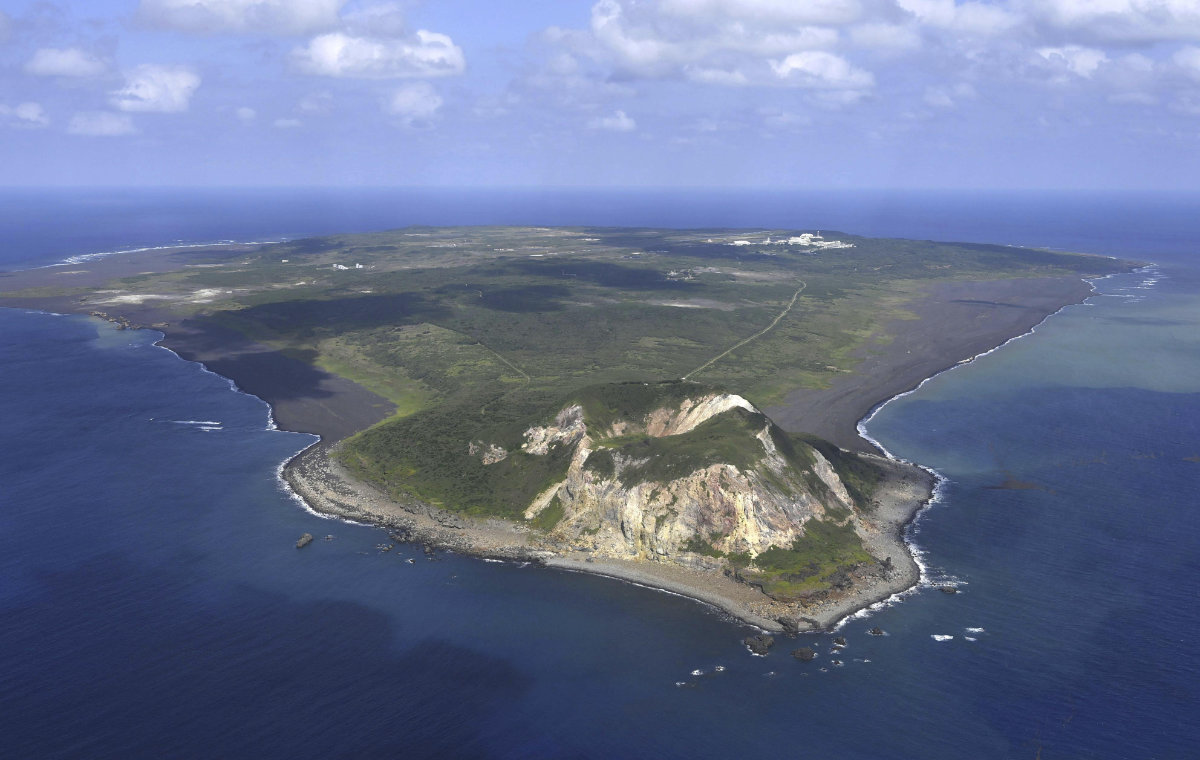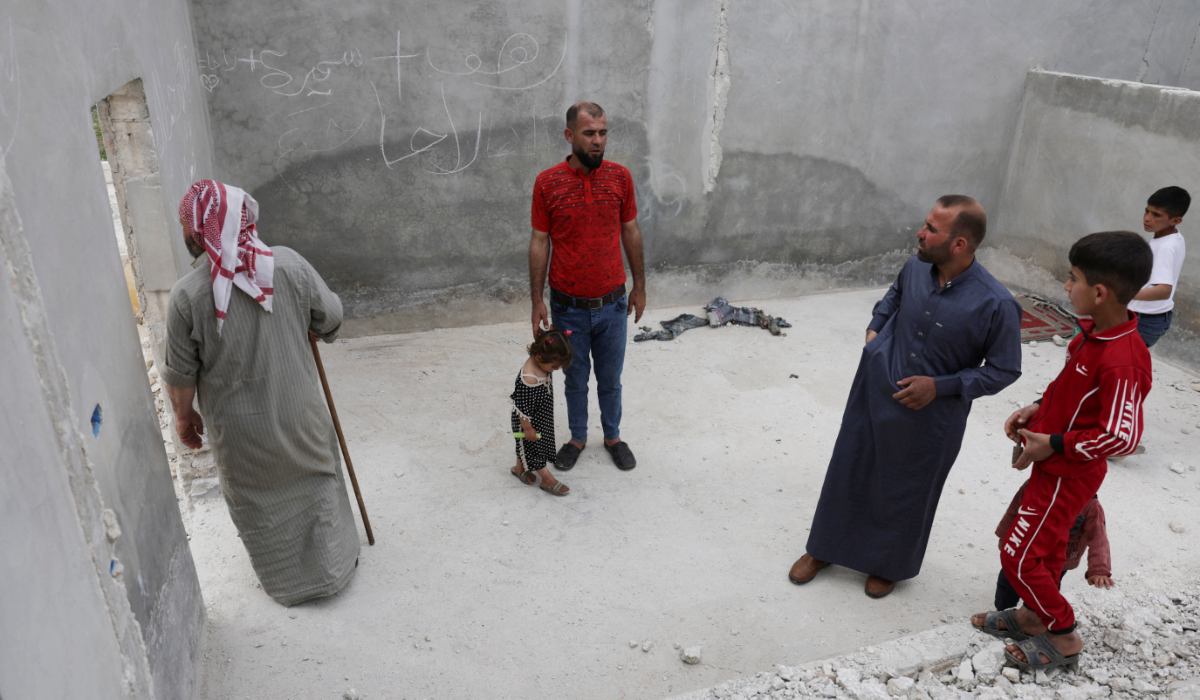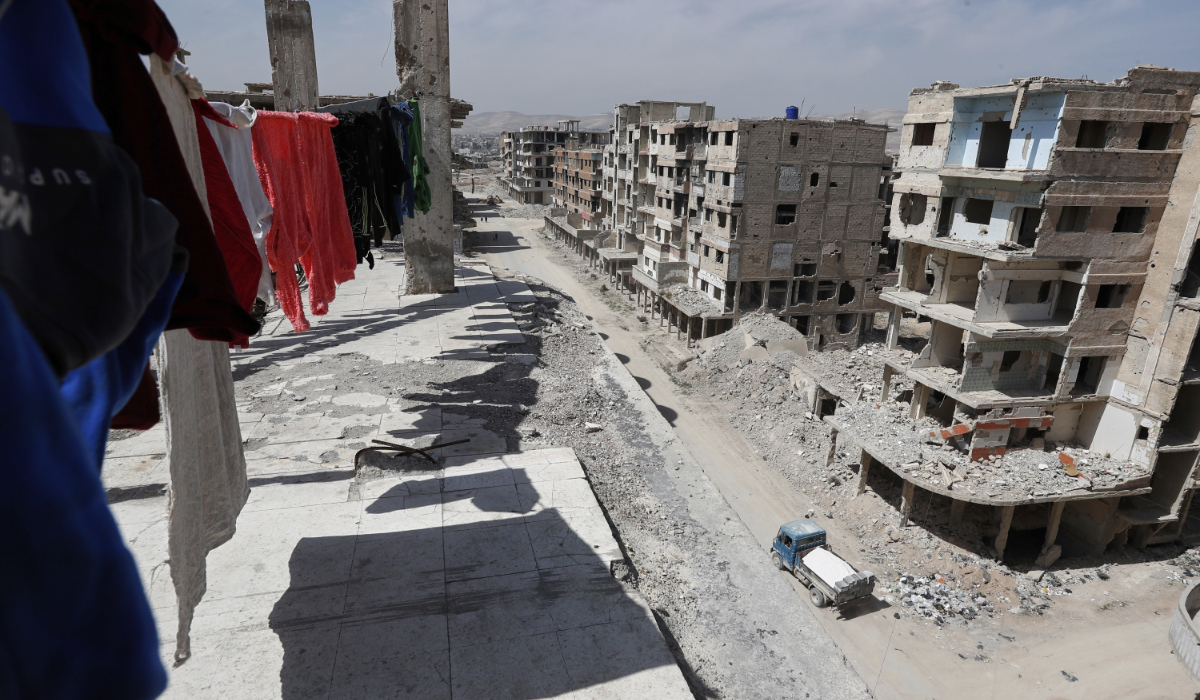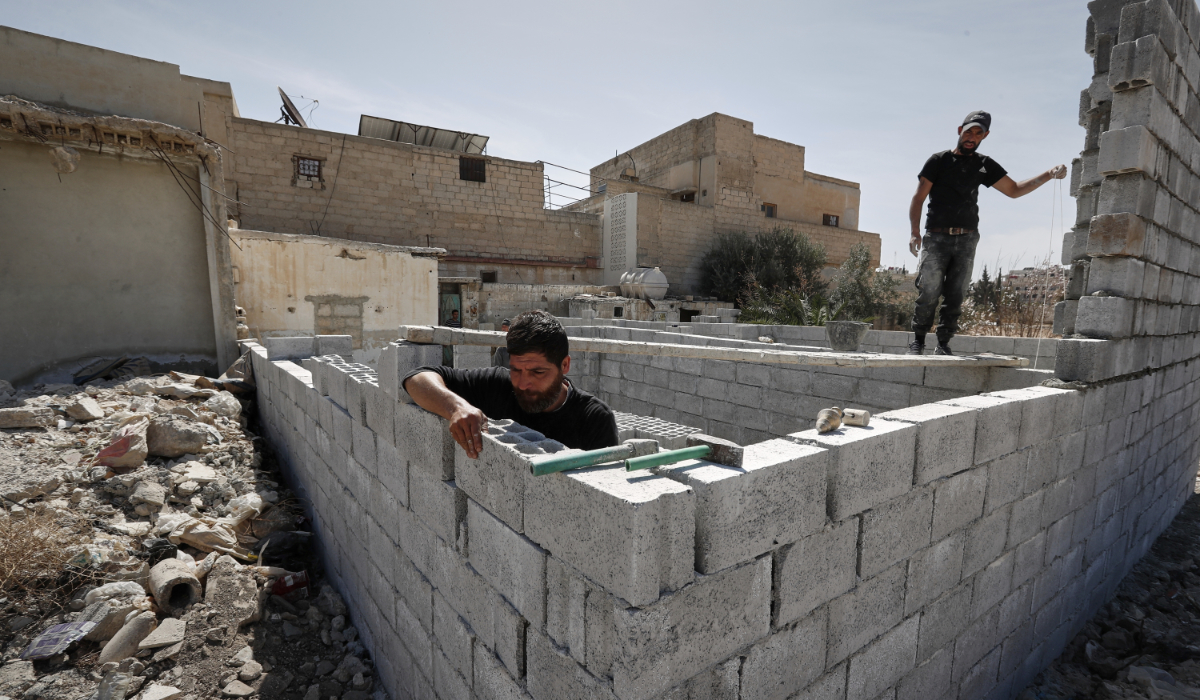NEW YORK: India captain Rohit Sharma allayed fears about an arm injury after making 52 before retiring hurt as his side thrashed Ireland by eight wickets in the teams’ T20 World Cup opener in New York on Wednesday.
India only required 97 to win after a dominant display by their bowling attack, with left-arm quick Arshdeep Singh striking twice in the third over to reduce Ireland to 9-2 after Rohit won the toss.
All-rounder Hardik Pandya took two wickets in two balls on his way to 3-27 and Jasprit Bumrah, the player of the match, 2-6.
“Just a little sore,” said Rohit at the presentation ceremony. “New ground, new venue, wanted to see what’s it like to play on. I don’t think the pitch settled down, there was enough there for the bowlers.”
Ireland, all out for just 96, needed to hold every chance to have any hope of a shock upset.
But Rohit had made just two when, off the last ball of the first over of India’s chase, he edged Mark Adair through the hands of Andrew Balbirnie at second slip.
Adair dismissed Virat Kohli for just one, when the star batsman sliced to deep third man, but the damage had been done as India launched their bid to win a first major title since their 2013 Champions Trophy triumph with a commanding Group A victory.
Rohit punished Ireland with a 37-ball innings, including four fours and three well-struck sixes as he shared a stand of 54 with Rishabh Pant.
The wicketkeeper, returning to international cricket after a horror car crash in December 2022, finished on 36 not out and ended the match with a typically flamboyant reverse-scooped six off Barry McCarthy as India won with nearly eight overs left.
Rohit was not there alongside him, however, having been previously struck on the arm by Josh Little, although he struck the next two balls from the paceman for resounding sixes.
Victory was all but secured for India, the inaugural 2007 T20 World Cup champions, when they dismissed Ireland cheaply as a drop-in pitch of variable bounce at a Long Island ground built specially for the tournament again proved tough to bat on.
India’s joy, however, would have been tempered by the thought they too could be batting first on a similar surface when they return to the ground on Sunday to play arch-rivals Pakistan in the showpiece match of the group phase.
“I don’t know what to expect against Pakistan, we will prepare like the conditions are going to be like that,” said Rohit.
Bumrah, however, had few qualms, with the fast bowler saying: “Coming from India, when you see the ball seaming around (here), I would never complain when there’s help for the bowlers.”
Only four Ireland batsmen reached double figures, Gareth Delany top-scoring with 26 before he was run out as the innings ended in the 16th over.
“A tough one,” said Ireland captain Paul Stirling. “The toss played a really important part in overcast conditions and then the pitch offered all sorts.
“We weren’t quite up to that challenge and India bowled really well to put us under pressure.”
Rohit plays down injury scare after India rout Ireland in T20 World Cup
https://arab.news/gfmww
Rohit plays down injury scare after India rout Ireland in T20 World Cup

- India only required 97 to win after a dominant display by their bowling attack, with left-arm quick Arshdeep Singh striking twice in the third over
- Rohit punished Ireland with a 37-ball innings, including four fours and three well-struck sixes as he shared a stand of 54 with Rishabh Pant
Aftershocks rattle Mandalay as rescuers search for survivors in Myanmar quake

- Myanmar's junta said at least 1,644 people were killed, more than 3,400 injured, and at least 139 more missing
- The junta issued an exceptionally rare appeal for international aid on Friday, indicating the severity of the calamity
MANDALAY, Myanmar: Residents scrambled desperately through collapsed buildings Sunday searching for survivors as aftershocks rattled the devastated city of Mandalay, two days after a massive earthquake killed more than 1,600 people in Myanmar and at least 11 in neighboring Thailand.
The initial 7.7-magnitude quake struck near the central Myanmar city of Mandalay early Friday afternoon, followed minutes later by a 6.7-magnitude aftershock.
The tremors collapsed buildings, downed bridges and buckled roads, with mass destruction seen in the city of more than 1.7 million people.
As dawn broke Sunday, tea shop owner Win Lwin picked his way through the remains of a collapsed restaurant on a main road in his neighborhood, tossing bricks aside one by one.
“About seven people died here” when the quake struck Friday, he told AFP. “I’m looking for more bodies but I know there cannot be any survivors.
“We don’t know how many bodies there could be but we are looking.”
About an hour later, a small aftershock struck, sending people scurrying out of a hotel for safety, following a similar tremor felt late Saturday evening.
Truckloads of firemen gathered at one of Mandalay’s main fire stations to be dispatched to sites around the city.
The night before, rescuers had pulled a woman out alive from the wreckage of a collapsed apartment building, with applause ringing out as she was carried by stretcher to an ambulance.
Myanmar’s ruling junta said in a statement Saturday that at least 1,644 people were killed and more than 3,400 injured in the country, with at least 139 more missing.
But with unreliable communications, the true scale of the disaster remains unclear in the isolated military-ruled state, and the toll is expected to rise significantly.
Junta chief Min Aung Hlaing issued an exceptionally rare appeal for international aid on Friday, indicating the severity of the calamity.
Previous military governments have shunned foreign assistance, even after major natural disasters.
Myanmar has already been ravaged by four years of civil war sparked by a military coup in 2021.
Anti-junta fighters in the country have declared a two-week partial ceasefire in quake-affected regions starting Sunday, the shadow “National Unity Government” said in a statement.
The government in exile said it would “collaborate with the UN and NGOs to ensure security, transportation, and the establishment of temporary rescue and medical camps” in areas that it controls, according to the statement, which was released on social media.
Aid agencies have warned that Myanmar is unprepared to deal with a disaster of this magnitude.
Some 3.5 million people were displaced by the raging civil war, many at risk of hunger, even before the quake struck.
Across the border in Thailand, rescuers in Bangkok worked Sunday to pluck out survivors trapped when a 30-story skyscraper under construction collapsed after the Friday earthquake.
At least 11 people have been killed in the Thai capital, with dozens more still trapped under the immense pile of debris where the skyscraper once stood.
Bangkok authorities were expected to release another statement at 9 am (0200 GMT), with fears of a further toll increase.
Workers at the site used large mechanical diggers in an attempt to find victims still trapped on Sunday morning.
Sniffer dogs and thermal imaging drones have also been deployed to seek signs of life in the collapsed building, close to the Chatuchak weekend market popular among tourists.
Authorities said they would be deploying engineers to assess and repair 165 damaged buildings in the city on Sunday.
Trump says ‘couldn’t care less’ if auto prices rise

- Trump has imposed a blanket 25 percent import tariff on cars and light trucks made outside the United States
- “I hope they raise their prices, because if they do, people are gonna buy American-made cars,” he said
WASHINGTON: US President Donald Trump declared on Saturday that he “couldn’t care less” if automakers increase car prices for Americans in the wake of his imposition of import tariffs.
There have been reports that Trump threatened auto executives with reprisals if prices jump, but he told NBC News that increasing prices would simply help US-based manufacturers.
“I couldn’t care less. I hope they raise their prices, because if they do, people are gonna buy American-made cars. We have plenty,” he told NBC host Kristen Welker.
On Thursday, Trump imposed a blanket 25 percent import tariff on cars and light trucks made outside the United States, due to take effect on April 3.
Tariffs will be delayed for car parts from countries covered by US trade pact with Mexico and Canada as officials try to disentangle the mixed supply chain.
But otherwise Trump intends for the import levy to be permanent, in order to boost US production and, in his view, save the American auto industry.
Despite his boosterism, however, share prices of the biggest US automakers have suffered and experts have warned that price rises will hit American consumers.
Asked by NBC News what his message would be to worried auto executives, Trump said: “The message is ‘congratulations.’“
“If you make your car in the United States, you’re going to make a lot of money.”
US defense chief Hegseth says ‘warrior’ Japan indispensable to deter China

TOKYO: US Defense Secretary Pete Hegseth said on Sunday that Japan was indispensable in tackling Chinese aggression by helping Washington establish a “credible” deterrence in the region, including across the Taiwan Strait.
“We share a warrior ethos that defines our forces,” Hegseth told Japanese Defense Minister Gen Nakatani at a meeting in Tokyo.
Calling Japan a “cornerstone of peace and security in the Indo-Pacific,” the Pentagon indicated that suggested President Donald Trump’s government would, like past administrations, continue to work closely with its key Asian ally.
Japan hosts around 50,000 US military personnel, squadrons of fighter squadrons and Washington’s only forward deployed aircraft carrier strike group along a 3,000-km (1,900-mile) archipelago that helps hem in Chinese military power.
Hegseth’s praise of Japan contrasts with the criticism he levelled at European allies in February, telling them they should not assume the US presence there would last forever.

Hegseth, who is in Asia on his first official visit, traveled to Japan from the Philippines. On Saturday he attended a memorial service on Iwo Jima, the site 80 years ago of fierce fighting between US and Japanese forces during World War Two.
Ukraine accuses Russia of ‘war crime’ with military hospital strike

- Ukrainian army statement said among the casualties were military personnel undergoing treatment at the medical center
- Moscow has rejected a joint US-Ukrainian proposal for an unconditional and full ceasefire, stepping up instead its offensive
KYIV: Ukraine accused Russia on Saturday of committing a “war crime” during a massive attack on the city of Kharkiv, which included strikes on a military hospital that wounded personnel undergoing treatment.
“The hospital building and nearby residential buildings were damaged by a Shahed drone,” the Ukrainian army said in a statement.
“According to preliminary reports, there are casualties among the military personnel who were undergoing treatment at the medical center,” it added.
Kyiv does not typically reveal data on military casualties and did not say how many soldiers were wounded.
It accused Russia of having carried out a “war crime” and “violating the norms of international humanitarian law.”
The Ukrainian emergency services said the “massive attack” on the northeastern city also destroyed residential and office buildings.
Governor Oleg Synegubov said two people were killed: a 67-year-old man and a 70-year-old woman. Another 25 people were wounded, including children, he added.
The latest deadly strikes on Kharkiv come as US President Donald Trump’s administration pushes for a speedy end to the more than three-year war, holding talks with both Russia and Ukraine.
Moscow has rejected a joint US-Ukrainian proposal for an unconditional and full ceasefire, while Ukraine has accused Russia of dragging out talks with no intention of halting its offensive.
According to Kyiv, a ceasefire agreeing to halt strikes in the Black Sea came into effect last week, but the Kremlin said the agreement will come into force only after the lifting of restrictions on its agriculture sector.
Nostalgia, relief and loss as some Syrians mark their first Ramadan back home in years

- They enjoy family reunions but many also face challenges as they adjust to a country ravaged by a prolonged civil war and now grappling with a complex transition
- Aabour – one of the more than 370,000 Syrians the United Nations’ refugee agency, UNHCR, says have returned to the country since Assad’s ouster – delights in hearing the call to prayer from mosques signaling the end of the daily fast
DARAYA, Syria: When Mariam Aabour learned of the ouster of Syrian leader Bashar Assad, she shed tears of joy. But as the time came to return to her homeland from Lebanon – where she fled years earlier – Aabour felt torn.
She was happy about the homecoming, but sad to leave behind a son and a stepson who remained in Lebanon to work and pay off family debts. Months before her return, Aabour’s father died in Syria without her seeing him. Her Syrian home has been destroyed and there’s no money to rebuild, she said.
Thus it’s been bittersweet experiencing her first Ramadan – the Muslim holy month – since her return.

“We’ve all lost dear ones,” she said. “Even after our return, we still cry over the tragedies that we’ve lived through.”
As they spend their first Ramadan in years in their homeland, many Syrians who’ve recently trickled back in from abroad have been celebrating the end of the Assad family’s rule in December after a fast-paced rebel offensive. They are relishing some new freedoms and savoring some old traces of the lives they once knew.
They enjoy family reunions but many also face challenges as they adjust to a country ravaged by a prolonged civil war and now grappling with a complex transition. As they do, they grieve personal and communal losses: Killed and missing loved ones, their absence amplified during Ramadan. Destroyed or damaged homes. And family gatherings shattered by the exodus of millions.
A time for daily fasting and heightened worship, Ramadan also often sees joyous get-togethers with relatives over food and juices.

Aabour – one of the more than 370,000 Syrians the United Nations’ refugee agency, UNHCR, says have returned to the country since Assad’s ouster – delights in hearing the call to prayer from mosques signaling the end of the daily fast. In her Lebanon neighborhood, she said, there were no nearby mosques and she relied on phones to know when to break the fast.
The hardest part, she added, is sitting for the fast-breaking meal known as “iftar” without some loved ones, including her father and a son, who she said was killed before the family fled Syria.
She bitterly recalled how her child, who she said was about 10 when killed, liked a rice and peas dish for iftar and would energetically help her, carrying dishes from the kitchen.

“I used to tell him, ‘You’re too young,’ but he would say, ‘No, I want to help you,’” she said, sitting on the floor in her in-laws’ house which her family now shares with relatives.
Faraj Al-Mashash, her husband, said he’s not currently working, accumulating more debt and caring for an ill father.
The family borrowed money to fix his father’s home in Daraya. It was damaged and looted, but still standing.
Many Daraya homes aren’t.
Part of Rural Damascus and known for its grapes and its furniture workshops, Daraya was one of the centers of the uprising against Assad. The conflict devolved into armed insurgency and civil war after Assad crushed what started as largely peaceful protests; this Ramadan, Syrians marked the 14th anniversary of the civil war’s start.
Daraya suffered killings and saw massive damage during fighting. It endured years of government besiegement and aerial campaigns before a deal was struck between the government and rebels in 2016 that resulted in the evacuation of fighters and civilians and control ceded to the government.
Today, in parts of Daraya, children and others walk past walls with gaping holes in crumbling buildings. In some areas, a clothesline or bright-colored water tank provides glimpses of lives unfolding among ruins or charred walls.
Despite it all, Al-Mashash said, it’s home.
“Isn’t Daraya destroyed? But I feel like I am in heaven.”
Still, “there’s sadness,” he added. “A place is only beautiful with its people in it. Buildings can be rebuilt, but when a person is gone, they don’t come back.”
In Lebanon, Al-Mashash struggled financially and was homesick for Daraya, for the familiar faces that used to greet him on its streets. Shortly after Assad’s ouster, he returned.
This Ramadan, he’s re-lived some traditions, inviting people for iftar and getting invited, and praying at a mosque where he has cherished memories.
Some of those who had left Daraya, and now returned to Syria, say their homes have been obliterated or are in no condition for them to stay there. Some of them are living elsewhere in an apartment complex that had previously housed Assad-era military officers and is now sheltering some families, mostly ones who’ve returned from internal displacement.
The majority of those who’ve returned to Syria since Assad’s removal came from countries in the region, including Lebanon, Jordan and Turkiye, said Celine Schmitt, UNHCR’s spokesperson in Syria.
A main security fear for returnees is unexploded mines, Schmitt said, adding UNHCR provides “mine awareness sessions” in its community centers. It also offers legal awareness for those needing IDs, birth certificates or property documents and has provided free transportation for some who came from Jordan and Turkiye, she said.
The needs of returnees, so far a fraction of those who’ve left, are varied and big – from work and basic services to house repairs or construction. Many, Schmitt said, hope for financial help to start a small business or rebuild, adding that more funding is needed.
“We’re calling on all of our donors,” she said. “There’s an opportunity now to solve one of the biggest displacement crises in the world, because people want to go back.”
Many of those who haven’t returned cite economic challenges and “the huge challenges they see in Syria” as some of the reasons, she said.
In January, UN High Commissioner for Refugees Filippo Grandi said living conditions in the country must improve for the return of Syrians to be sustainable.
Umaya Moussa, also from Daraya, said she fled Syria to Lebanon in 2013, returning recently as a mother of four, two of whom had never seen Syria before.
Moussa, 38, recalls, at one point, fleeing an area while pregnant and terrified, carrying her daughter and clutching her husband’s hand. The horrors have haunted her.
“I’d remember so many events that would leave me unable to sleep,” she said. “Whenever I closed my eyes, I would scream and cry and have nightmares.”
In Lebanon, she lived for a while in a camp, where she shared the kitchen and bathroom with others. “We were humiliated ..., but it was still better than the fear we’ve lived through.”
She’d yearned for the usual Ramadan family gatherings.
For the first iftar this year, she broke her fast with her family, including brothers who, she said, as fighters against the Assad government, had previously moved to then rebel-controlled Idlib province.
Missing from the Ramadan meal was her father who died while Moussa was away.
Like Moussa, Saeed Kamel is intimately familiar with the pain of a joy incomplete. This Ramadan, he visited the grave of his mother who had died when he was in Lebanon.
“I told her that we’ve returned but we didn’t find her,” he said, wiping away tears.
And it wasn’t just her. Kamel had been hopeful that with Assad gone, they would find a missing brother in his prisons; they didn’t.
Kamel had vowed never to return to a Syria ruled by Assad, saying he felt like a stranger in his country. His home, he said, was damaged and looted.
But despite any difficulties, he held out hope. At least, he said, “the next generation will live with dignity, God willing.”
Kamel fondly recalled how – before their worlds changed – his family would exchange visits with others for most of Ramadan and neighbors would send each other iftar dishes.
“Ramadan is not nice without the family gatherings,” he said. “Now, one can barely manage.”
He can’t feel the same Ramadan spirit as before.
“The good thing,” he said, “is that Ramadan came while we’re liberated.”





















